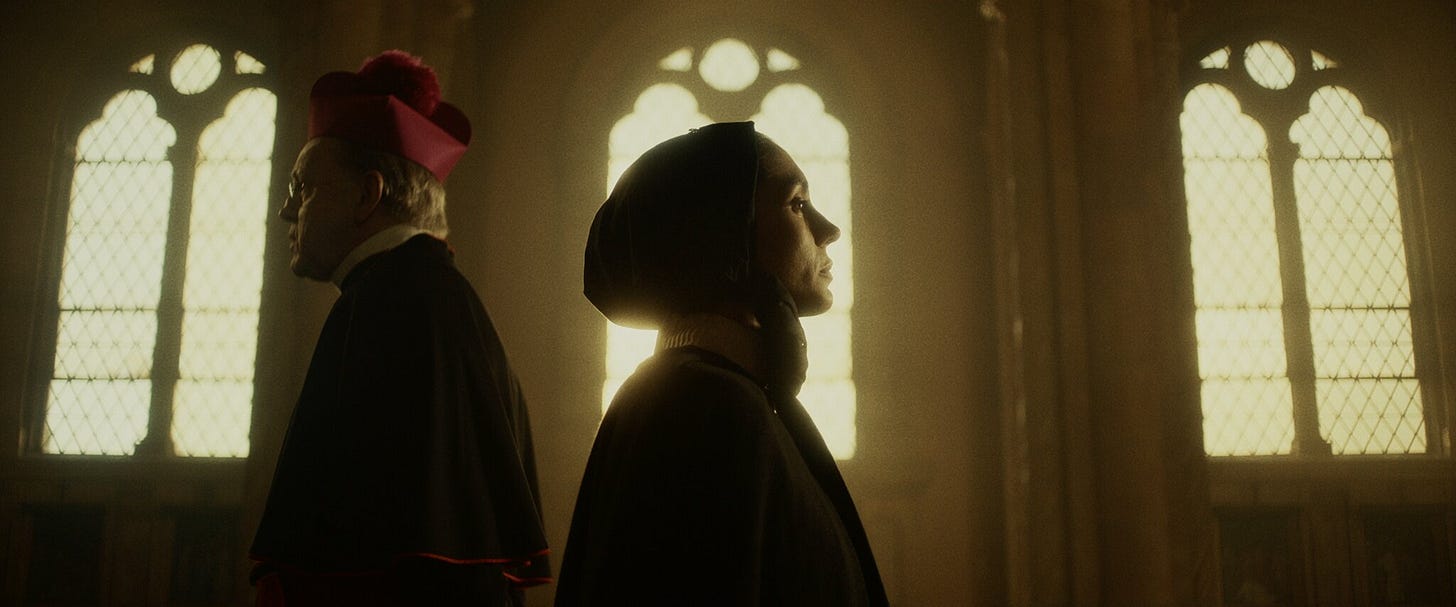What kind of world do we want, and what will we do to achieve it? Those are the questions with which Alejandro Monteverdi’s Cabrini leaves us at the end of its 140 minutes. The questions land harder after the story we’ve seen.
The first time we see the face of Cristiana Dell’anna as Francesca Saverio Cabrini — Saint Frances Xavier Cabrini, as she’s best known in the English-speaking world — she is donning her coif and wimple before a mirror, her expression a fragile mask of resolve belying the violent coughing fit from which she has just recovered. This act of vesting, it becomes clear, is a kind of gearing up for battle. It is spiritual warfare, of course, but the battlefield is everywhere, both inside and outside the Church. The enemy’s assets include sexism, anti-Italian bigotry, and both clericalism and anti-clericalism, as well as extremes of desperate poverty and privileged wealth side by side, never the twain meeting.
Repeatedly Mother Cabrini is told to “stay where you belong” or scolded for “wandering into rooms where you don’t belong.” In a flashback to a key childhood incident — a near-fatal drowning that left her with compromised lungs and a lifelong fear of water — we hear a doctor declaring that “her bed will be her life — that is where she belongs.”
Today Saint Frances Cabrini is celebrated as a pioneer: the first U.S. citizen to become a canonized saint, the first Catholic woman to lead an overseas mission, and the trailblazing founder of the Missionary Sisters of the Sacred Heart of Jesus, which runs charitable institutions the world over. Yet Cabrini emphasizes that none of it would have happened had Mother Cabrini been content to remain in spaces deemed appropriate for her by the powerful men around her. Opening on March 8, International Women’s Day, Cabrini evokes the much-misattributed remark of American historian Laurel Thatcher Ulrich that “Well-behaved women seldom make history.”
A prologue, set in New York in 1889, establishes the harsh reality that will confront Mother Cabrini and her six sisters upon their arrival later that year. A young boy we come to know as Paolo (Federico Ielapi) trots desperately through the streets of the Five Points neighborhood pushing a wheelbarrow containing his dying mother to a hospital. In the hospital his cries for help are ignored by uncomprehending staff, and a blue-frocked police officer roughly shows him the door.
A small detail twists the knife: Paolo has been turned away from Mount Carmel Hospital — a Catholic institution. The police officer and most of the staff are probably Irish American, like New York Archbishop Michael Corrigan (David Morse), who initially wants to send the sisters packing back to Italy. The problems of the impoverished Italians of Five Points are by and large not the concern even of their fellow New York Catholics…





